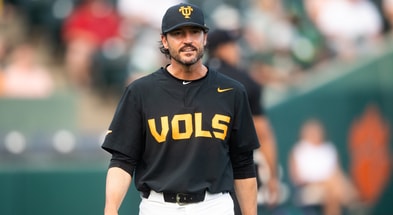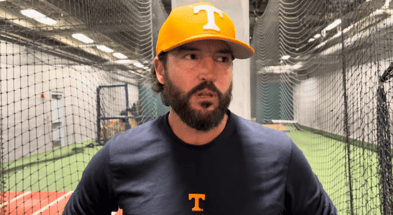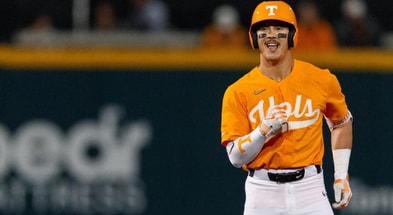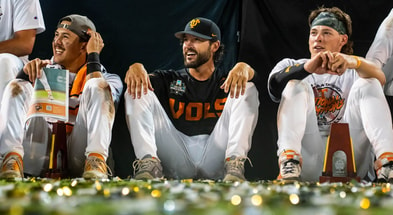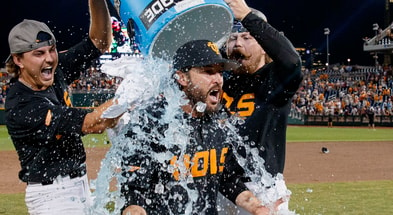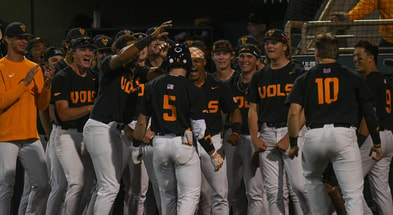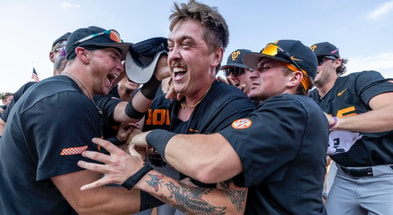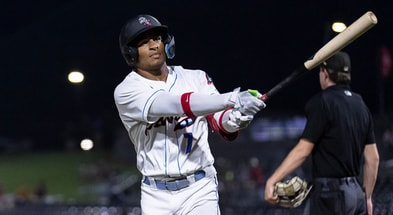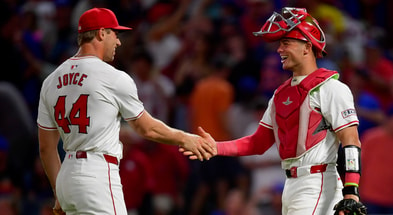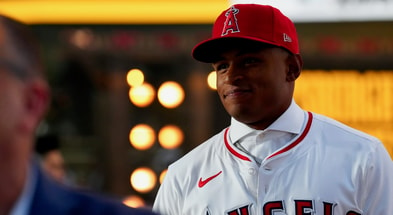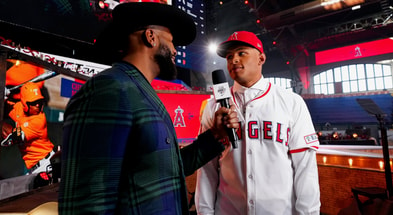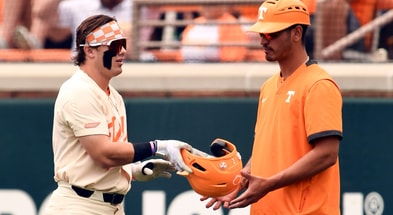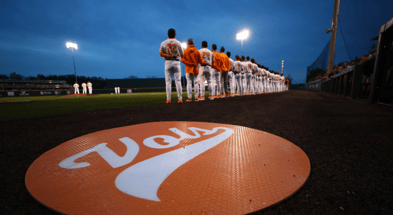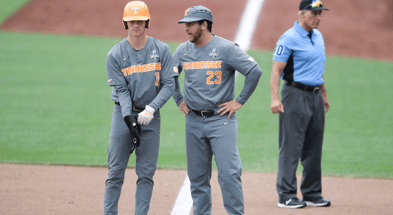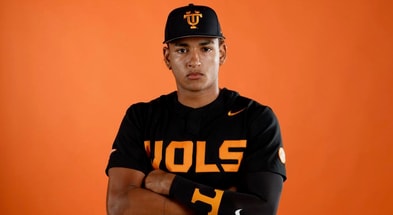What Jim Schlossnagle, No. 3 Texas A&M said after beating No. 1 Tennessee
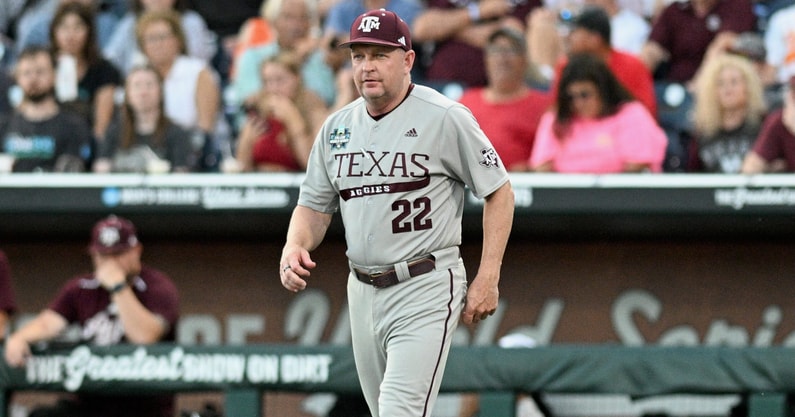
Everything Texas A&M’s Jim Schlossnagle said after the Aggies beat No. 1 Tennessee 9-5 in Game 1 of the College World Series championship series Saturday night at Charles Schwab Field in Omaha:
JIM SCHLOSSNAGLE: Great ball game. Certainly thought we played really well for the most part. We got a lot of timely hits. Had some good at-bats against some really good pitchers.
Tennessee has a very good pitching staff, very diverse pitching staff. I thought Prager battled through some things. And Stewie was awesome. And Evan was Evan. And Kaeden Kent just continues to play outstanding the back half of the season.
It’s one win. Can’t make it more than that. Still got a ball game to win — got a series to win, kind of like the regular season.
Q. Kaeden, I was hoping you would take us through that at-bat in the seventh inning, the home run. And what do you attribute this incredible postseason run you’ve been fortunate enough to go on?
KAEDEN KENT: I think it’s attributed to the support that I get and the people that believe in me, the people that have my back and I can count on, and people that I can, like my parents or my brother, I can look to the stands and they can give me, they can pound their chest, like you got this. That puts a lot of relaxation on my mind, kind of to ease down.
Anyway, that at-bat, it was a 2-2 slider, and I don’t know, he hung the slider. I was able to get it.
Q. Kaeden, could you expand on what does it take to be ready to step up in an opportunity like this? And what’s it like for yourself and some of the younger players like Caden Sorrell and Gavin Grahovak to come up with some of these big hits in college baseball?
KAEDEN KENT: Even though they’re young, I think we’re past the young phase. Gavin Grahovak is so mature. So is Sorrell. They’re good baseball players. And their brain works super well. Their ability to come out here and play is amazing.
What it takes to be prepared. Baseball is a frustrating game. So the consistency and the time that you put in is not always shown out on the field when you play.
So the countless hours in the cages sometimes turns into an 0-for-4 when you go out on Tuesday. But it’s just the repetition, man, you’re stacking days on days. The compound effect. And you just gotta keep pushing through it.
Q. Kaeden, what makes this team so good at two-strike hitting? And what does it mean to you to be able to have the performance you’ve been having filling in for Braden, kind of taking up the mantle while he watches?
KAEDEN KENT: Two-strike hitting, we don’t have a two-strike approach. Our approach the whole time is swing at strikes and take balls, as hard as that is. That’s what we do. That’s our mantra, that’s what we fall back to.
And I mean it means a lot especially when you’re playing in front of these fans. The 12th Man is amazing. You’ve probably heard it. You’re probably tired of hearing it, but they’re real. They support us. They’re just as a factor in winning games as we are.
Q. Evan, you come into the game after Tennessee hits the back-to-back homers and momentum is maybe shifting back to their side. Can you talk about coming into the game in that big of a moment and shutting them down for the rest of the game?
EVAN ASCHENBECK: It’s just something I’ve been doing all year, just kind of try to give my team the best chance to win. That’s what pitchers are there for. And Max tells us all the time, if some guy comes in doesn’t have a good outing the next guy can’t do that.
Our job as a relief picture is to come in and pick up the guys in front of us. To come into that opportunity, it was awesome because the atmosphere was crazy. It’s the College World Series. Everything’s cool about it.
So just staying present and going pitch to pitch is something that worked for me.
Q. Kaeden, I know the Oregon grand slam you kind of talked about how you were able to soak that in a little bit. Didn’t know if this one you were able to because you really got hold of it. Did you say anything to Coach that you were going to hit a bomb out there?
KAEDEN KENT: No. I didn’t say anything to coach. That’s not — I’m not that confident, man.
But, no, I was able — yeah, rounding the bases I was able to take it in. The bullpen was going crazy. The fans were so loud; these fans are amazing. I love playing in front of these fans. They help us out so much and so much credit to them.
Q. Evan, I know you’ve been in big moments on big stages before, but what was your mindset? And how did it feel out there getting to close a championship series game?
EVAN ASCHENBECK: Mindset was just to win. Do anything that I can to help this team win. And at the end of the day that’s what all the postseason is about is doing things and doing my best ability to give my team the best chance to win.
When I get the opportunity to go out and pitch, I just want to throw strikes, limit free bases. If they get hit, they get hit. It’s baseball. It’s going to happen. You’ve just got to keep going pitch to pitch and strike to strike.
Q. Evan, seven of the eight outs you recorded were strikeouts. What was working for you in that regard? At 46 pitches, how are you feeling about potentially pitching tomorrow or Monday, if not tomorrow?
EVAN ASCHENBECK: Just mixing pitches and throwing everything in the strike zone, it’s what I can do. It’s what my strength is, just making sure that I can throw everything for strikes and keep them off balance. That’s what’s been working for me all year.
But as far as tomorrow and the next day, it’s the College World Series. I’ll be ready to go. There’s no doubt in my mind that I’ll be ready. I know Coach Schloss will have me up and ready to go. I’ll be up and ready to go.
Q. Evan, also you guys had 17 strikeouts tonight. And similar to previous question, what was just working with you tonight? And were some of the breaking pitches you utilized and having Jackson behind the dish that commanded all you guys today?
EVAN ASCHENBECK: Having him behind the plate, he gives us so much confidence because we can throw any pitch we want to wherever we want to, and knowing that he’s going to work his hardest to block it up or keep it in front of us just to give us a chance.
But having him behind the plate is awesome. Like I said, it’s just mixing pitches and throwing strikes, really. It’s hard to, I guess, get a pitcher if he’s throwing strikes. But that’s what Coach always said, you’ve just got to throw strikes, free bases, and that’s kind of what I did.
Q. You said earlier, “Evan was Evan”. It’s so easy to take that for granted when the guy is so automatic all year long. When you say “Evan was Evan” what’s that mean?
JIM SCHLOSSNAGLE: I don’t take him for granted. I’ve had some great relievers in the past, and he’s right up there with all of them. You just know he’s going to control his heartbeat, number one. The moment’s never too big. He’s going to be in the strike zone with at least two pitches, usually three.
And if he gives up a hit like he did, or give up back-to-back hits to Amick and Dreiling, he doesn’t panic. He just gets right back in the strike zone.
I always measure a pitcher by what’s my heart rate like when he pitches. When he pitches my heart rate is not good during most games, but when he pitches it’s way better. The same with Prager, guys that fill up the strike zone and give you a chance. Just give us a chance to catch the ball, especially against such a great offense.
You’ve got Tears sitting there in the 6, 7 hole. What a lineup. You can never feel good about it. But, yeah, Evan is a great luxury for us to have that most teams don’t — championship teams do, but most teams don’t get that.
Q. How much of two-strike hitting is taught and how much of it, in your perspective, is just God-given talent?
JIM SCHLOSSNAGLE: I think there’s different offensive philosophies. We don’t have any sort of two-strike approach. There’s nothing that we work on. It’s just swing at strikes and take the balls.
And that’s the first thing we work on the very first day of fall practice. And a guy can hit a homer with two strikes, just like Kaeden did, just like he can with no strikes. I’m not telling you that’s the right way to do it.
We strike out a lot. If the umpire does his job, most of our strikeouts — we’ll swing and miss some. But a lot of our strikeouts are looking outside of SEC play because the umpiring — sorry, I probably shouldn’t say that — but just if the umpire doesn’t screw it up — we lead the nation in walks for a reason. We know the strike zone.
And I think most college teams, Tennessee probably, the upper level college teams are — they’re so well-trained in the strike zone because we have Trackman and all these things we practice on every single day.
And one thing I think we need to get to eventually in college baseball — the umpires aren’t full-time umpires — are the umpires training like the players, so we can have the same game.
Anyway, to answer your question, we don’t have a real two-strike approach. If it’s a strike you’ve got to swing at it. I think in a batting practice, sometimes when the ball, if they take a strike, we say something to them. If they swing at a ball, we say something to them.
Top 10
- 1Breaking
John Mateer
Top portal QB commits to Oklahoma
- 2Hot
Diego Pavia
Vandy QB granted eligibility
- 3New
Vols troll OSU
Apple Maps changes The Shoe
- 4
Alabama AD: 'Fight back'
SEC NIL wars take next step
- 5
Johni Broome injury
Positive news on Auburn star
Get the On3 Top 10 to your inbox every morning
The compounding effect of that over time just leads — we get in deep counts and hopefully take our walks but can still fight and win with two strikes.
Q. We’ve heard you use your football analogy when it comes to three phases, that being pitching, defense and timely hitting. And getting a game one victory, how do you think your team fared in those three phases this evening?
JIM SCHLOSSNAGLE: I thought we did really well. Obviously I thought Prager was great. Stewie made the pitches he needed to make. The home run that got hit off of him, the wind was blowing — I’m not saying that guy didn’t get it good but if Jace didn’t run into the wall, I think he might have caught that one too.
You held maybe the best lineup in the country to five runs with the wind blowing out in such an awesome setting. I thought we caught the baseball well. Kent made some nice plays. Teddy made some nice plays. And then we got a lot of timely hits.
We strung together some singles through the infield against a good pitcher in Causey. I think we had some luck, too — which is part of the game.
Q. When you’re recruiting guys like Kaeden and like Gavin, how much are you able to tell about composure and confidence? Obviously you know their ability, but to come into this level of baseball and perform the way they are, how much are you able to gauge that early on?
JIM SCHLOSSNAGLE: You can gauge it a little bit. Obviously a guy like Kent grew up in a big league clubhouse. Most sons of Major League players, and I’ve coached several, that’s one thing, they handle it pretty well.
Grahovak, son of a coach, been around high-level baseball. Those super high prospects these days, they play in big league parks and all their showcases. I think they’re more prepared than players were 10, 15 years ago.
But mental skills are something we practice. We invest a lot of time, effort and money in mental skills. Mental skills can be practiced just like physical skills can be practiced. It’s the very first thing we do when we take our hitters to the batting cage the first day of the fall is talk about their routine and the ability to handle moments and the ability to play the game pitch to pitch.
That’s why, when you play in the SEC and you play in Olsen Field in front of the 12th Man — yes, it’s the College World Series, it’s the championship series — but if you’re in our dugout it literally doesn’t feel any different. And I think that is intentional.
We are — I’m not saying Tennessee doesn’t — I’m just saying we really, really, really try to coach that, because you cannot be in control of your performance until you’re in control of yourself. And that’s the key to these games, in my opinion.
Q. When you talked to the team tonight, is there like a lesson that you learned from tonight? Or is it just another game tomorrow night?
JIM SCHLOSSNAGLE: I don’t meet with teams after games unless we’ve lost a tough one or if I’m upset with them about something. I don’t meet with teams after games. Haven’t done that since 2013.
We’ll get on the bus. I’ll congratulate them on the win. They know it’s one game. We all know what’s at stake. There’s no Lombardi speech. We just try to keep them as loose as we can. We’ll hit in the cages and get our ground balls tomorrow and play.
I know it sounds coachy, but if you start thinking about things other than that, Tennessee is going to blow you out of this ballpark. We’re facing a great team and we’re facing a great pitcher tomorrow. And I have no idea who we’re going to pitch. We’ll put it together. But we’ll just do what we do. That’s all we can do.
Q. You talked about playing well, maybe lowering your heart rate a little bit. Just to see Gavin start off the game like that, how much does that help for the whole clubhouse to take a breath? And how do you channel that moving forward, knowing two runs in the first inning feel good but, as you mentioned, that Tennessee lineup is so loaded.
JIM SCHLOSSNAGLE: Chris with ESPN asked me before the game what was one of the keys. I said just getting through the first inning. I think for any pitcher in these moments, especially against the lineups — even though we scored the two runs, I was like, you’ve got to go face Christian Moore. He swings at the first pitch of the game almost every time, if it’s a strike. He does huge damage to it.
You can’t ever feel good about anything. But when you get two runs, okay, get some positive vibes in the dugout. That’s why I kind of like actually being the visiting team in some of these big games because you get to take the energy of the game into offense versus taking it on the field and on defense; that can be tough.
Q. Ryan came out, I think he had five runners in scoring position, they only scratched out two runs. They had seven hits. He threw 16 first pitch strikes. What are your thoughts on how good he was tonight?
JIM SCHLOSSNAGLE: I thought he was great. We knew it wasn’t going to be his very best stuff throwing on short rest, but Max has done such an unbelievable job with our pitching staff in getting them to believe in throwing the ball in the strike zone, especially against Tennessee, there’s going to be some damage, but you’ve got to limit damage by not giving up free bases.
So what, did we walk three? Stewie walked three but we punched out 17 against a good offense. I think it’s just truly committing to throwing the ball in the strike zone and most young pitchers throw hard but they don’t throw strikes. The more strikes we throw, limit free bases, the better chance our team has to win.
Q. You said yesterday that it would take a village to get through this series with your pitching staff. You’ve touched on it a little bit tonight. Could you talk about what you saw from your entire pitching staff and not limiting or not having any crooked numbers on the scoreboard?
JIM SCHLOSSNAGLE: They had the one 3-spot, the back-to-back homers. We pitched one guy that hadn’t pitched in the weekend. Brad threw two strikes and one of them got hit out. He threw two pitches and they were both strikes. That at least gives us a chance.
But we’re going to need somebody other than Stewart. Obviously Cortez could be a part of it tomorrow more than likely. Gotta decide what we’ll do with Lamkin, but if we’re going to get through this thing, there’s some guys that haven’t pitched yet that are going to have to give us something.
I thought Tony did an awesome job, and Frank, they always do an awesome job with their pitching staff. They gave some guys some work and they still were able to keep the game somewhat close.
Connell and Causey for sure can pitch again, and I’m sure Stamos will be back at some point if they need him. They have plenty of pitching. We’re going to have to match that.

